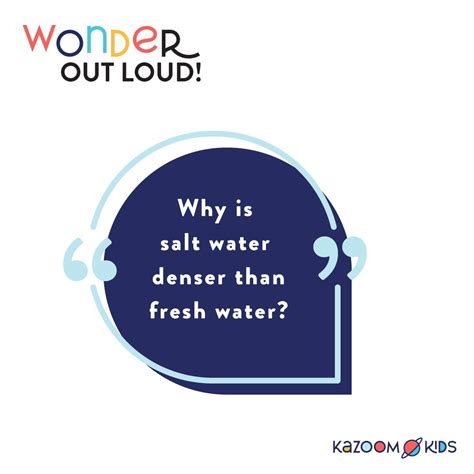The density of water is a fundamental concept in understanding various natural phenomena, including ocean currents, aquatic life, and even the way we design ships and offshore structures. At the heart of this discussion lies the difference in density between saltwater and freshwater. But what makes salt water denser than fresh water?
Understanding Density
Before diving into the specifics of saltwater and freshwater, it's essential to grasp the concept of density. Density is a measure of how much mass is contained in a given volume of a substance. It's expressed as kilograms per cubic meter (kg/m³) or grams per cubic centimeter (g/cm³). The higher the density, the more massive the substance is for a given volume.

The Role of Salinity
Salinity is the primary factor that distinguishes saltwater from freshwater. Salinity refers to the concentration of dissolved salts in water, typically measured in parts per thousand (ppt) or practical salinity units (psu). Seawater, which is the primary component of the world's oceans, has an average salinity of around 35 ppt. This means that for every kilogram of seawater, there are approximately 35 grams of dissolved salts.
The dissolved salts in seawater are primarily composed of sodium chloride (NaCl), magnesium chloride (MgCl₂), and calcium sulfate (CaSO₄). These salts dissolve in water, increasing its mass without significantly changing its volume. As a result, the density of saltwater is higher than that of freshwater.

Other Factors Affecting Density
While salinity is the primary factor influencing the density of seawater, other factors also play a role. Temperature and pressure are two significant factors that affect the density of water.
Temperature affects the density of water because it changes the kinetic energy of the water molecules. As temperature increases, the molecules move faster and spread out, reducing the density of the water. Conversely, as temperature decreases, the molecules slow down and come closer together, increasing the density.
Pressure also affects the density of water, although its impact is more significant at greater depths. As pressure increases with depth, the water molecules are compressed, increasing the density of the water.

Comparison of Saltwater and Freshwater Density
Now that we've discussed the factors affecting the density of water, let's compare the densities of saltwater and freshwater.
Freshwater, which is typically defined as water with a salinity of less than 1 ppt, has a density of around 1,000 kg/m³ at 20°C (68°F). Seawater, on the other hand, has an average density of around 1,030 kg/m³ at 20°C (68°F).
The difference in density between saltwater and freshwater is approximately 3%, which may seem insignificant. However, this difference has significant implications for various natural and engineering applications.

Implications of Density Differences
The difference in density between saltwater and freshwater has several implications for various fields, including:
- Oceanography: The density difference between saltwater and freshwater drives ocean currents and influences the global climate.
- Aquatic life: The density of water affects the buoyancy and swimming behavior of aquatic organisms.
- Engineering: The density of seawater is crucial in designing offshore structures, such as bridges, piers, and ships.
- Environmental science: The density of water affects the movement of pollutants and nutrients in aquatic ecosystems.






What is the primary factor that affects the density of seawater?
+The primary factor that affects the density of seawater is salinity, which is the concentration of dissolved salts in water.
How does temperature affect the density of water?
+Temperature affects the density of water by changing the kinetic energy of the water molecules. As temperature increases, the molecules move faster and spread out, reducing the density of the water.
What are some implications of the density difference between saltwater and freshwater?
+The density difference between saltwater and freshwater has implications for oceanography, aquatic life, engineering, and environmental science.
In conclusion, the density of water is a complex topic that is influenced by various factors, including salinity, temperature, and pressure. Understanding the density of water is crucial for various applications, including oceanography, aquatic life, engineering, and environmental science.
